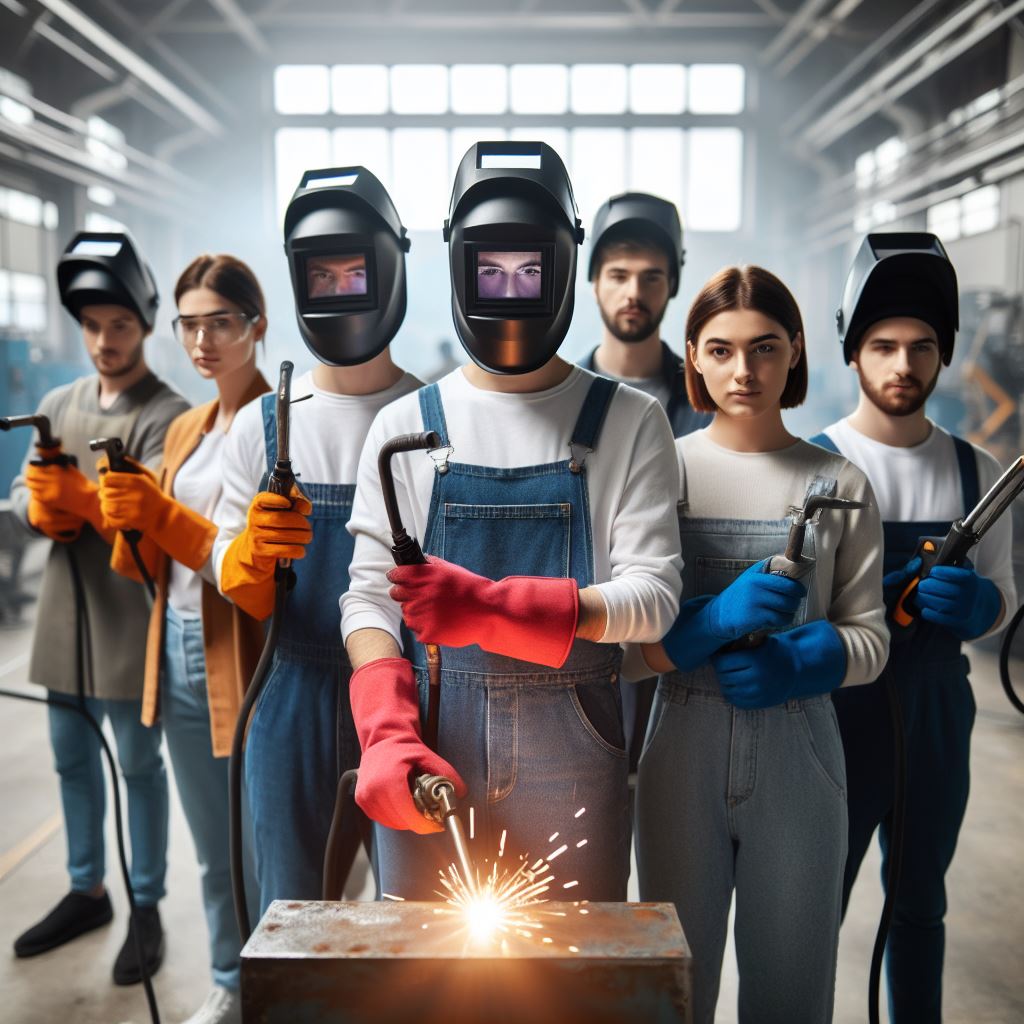Introduction
Welders are vital in numerous industries, playing a crucial role in construction, manufacturing, and infrastructure development.
This blog post aims to offer a glimpse into the daily life and responsibilities of a UK-based welder.
By understanding their routine and tasks, we can better appreciate the impact they have on society.
Welding is a skill that joins metal components, creating sturdy structures capable of withstanding immense pressure and weight.
Without welders, buildings, bridges, and machinery would lack the stability required for everyday operations.
In this blog post, we will delve into the typical day of a UK-based welder, shedding light on their work environment, challenges, and achievements.
From the earliest morning hours to a well-deserved rest at night, we will explore the variety of tasks they undertake to ensure the safety and reliability of their projects.
You will discover the precision and expertise required in assessing blueprints, preparing materials, and operating welding equipment.
The blog will also highlight the significance of safety measures, such as protective gear and adherence to industry regulations.
By gaining insights into the life of a UK-based welder, we can foster appreciation for their commitment, skill, and contributions to the nation’s infrastructure and manufacturing sectors.
Stay tuned for an in-depth look at the meticulous work and dedication behind every welded structure.
Overview of the Welding Profession in the UK
In the United Kingdom, welding is a profession that plays a vital role and holds great significance in various sectors.
This blog section will provide an overview of the welding profession, discussing the role and significance of welding in different sectors, the types of welding techniques commonly used by professionals in the UK, and the demand for skilled welders in various industries.
Role and significance of welding in different sectors
- Construction Sector: Welding is essential in the construction industry for joining metal components, reinforcing structures, and creating metal frameworks.
- Automotive Sector: Welding is crucial in the automotive industry for manufacturing vehicles, repairing damaged parts, and ensuring structural integrity.
- Aerospace Sector: Welding plays a significant role in the aerospace industry for fabricating aircraft structures, assembling components, and maintaining aircraft safety standards.
- Energy Sector: Welding is indispensable in the energy sector for constructing pipelines, maintaining power plants, and repairing equipment used in oil, gas, and renewable energy industries.
- Shipbuilding Sector: Welding is vital in shipbuilding for fabricating ship hulls, attaching steel plates, and ensuring the structural integrity of vessels.
Types of welding techniques commonly used by professionals in the UK
- Shielded Metal Arc Welding (SMAW): Also known as stick welding, SMAW is a versatile technique using a consumable electrode.
- Gas Metal Arc Welding (GMAW): Commonly called MIG welding, it uses a continuous solid wire electrode and shielding gas.
- Gas Tungsten Arc Welding (GTAW): Also known as TIG welding, GTAW produces high-quality welds using a non-consumable tungsten electrode and an inert gas.
- Flux-Cored Arc Welding (FCAW): FCAW uses a tubular wire electrode with flux to shield the weld pool, suitable for outdoor and windy conditions.
- Submerged Arc Welding (SAW): SAW involves the formation of an arc between a continuously fed wire electrode and the workpiece, submerged under a layer of granular flux.
The demand for skilled welders in various industries
The welding profession in the UK is in high demand, and skilled welders are sought after in several industries.
- The construction industry requires welders to build and strengthen structures, bridges, and architectural frameworks.
- The oil and gas industry needs skilled welders for pipeline construction, maintenance, and repairs.
- The automotive industry relies on welders during the manufacturing and repair process to ensure the safety and durability of vehicles.
- The energy sector, including the renewable energy industry, requires welders to construct wind turbines, solar panels, and power plant infrastructure.
- The aerospace industry demands welders for assembling aircraft components, maintaining airframes, and repairing specialized equipment.
In short, welding is a profession that holds immense significance in various sectors in the UK.
Personalized UK Career Consulting
Receive tailored career guidance designed just for you. Get actionable steps and expert support to boost your career in 1-3 days. Take control of your career now.
Get StartedWith different welding techniques and a high demand for skilled professionals, welders play a crucial role in constructing, maintaining, and repairing structures, vehicles, aircraft, and energy infrastructure in the country.
Read: UK Welding Laws and Regulations: A Guide
Qualifications and Skills Required to Become a Welder in the UK
When it comes to pursuing a career as a welder in the UK, there are certain qualifications and skills that aspiring professionals must possess.
Let’s take a closer look at the educational and training requirements, the importance of certifications and relevant skills, as well as the necessity of practical experience in the field.
Educational and Training Requirements
- To enter the welding profession, it is essential to have a high school diploma or an equivalent qualification.
- Many vocational schools and colleges across the UK offer specialized programs in welding.
- These educational institutions provide theoretical knowledge along with hands-on training in welding techniques.
- Completing a welding course or program is highly recommended to gain a comprehensive understanding of the trade.
- Once the theoretical foundation is established, aspiring welders can then focus on honing their practical skills through various training methods.
Importance of Certifications and Relevant Skills
- Acquiring relevant certifications plays a crucial role in establishing credibility within the welding profession.
- The most widely recognized certification in the UK welding industry is the City and Guilds Welding Certification.
- This certification validates the welder’s proficiency in various welding techniques and ensures adherence to industry standards.
- In addition to certifications, welders are expected to possess certain skills to excel in their day-to-day tasks.
- Some of these skills include attention to detail, manual dexterity, good hand-eye coordination, and the ability to interpret technical drawings.
The Need for Practical Experience
- While theoretical knowledge and certifications are crucial, practical experience is equally essential in the field of welding.
- Most employers in the UK prefer candidates with some level of hands-on experience in welding.
- Practical experience enables welders to apply their theoretical learning to real-world situations and challenges.
- Additionally, it helps develop a deeper understanding of welding techniques, safety precautions, and industry-specific regulations.
- One effective way to gain practical experience is to seek apprenticeship or on-the-job training opportunities with established welding companies.
In fact, becoming a welder in the UK requires a combination of educational qualifications, relevant certifications, and practical experience.
Aspiring professionals must complete a welding program to gain theoretical knowledge and hands-on training.
Acquiring certifications, particularly the City and Guilds Welding Certification, is highly recommended to establish credibility.
Furthermore, possessing skills like attention to detail and manual dexterity is crucial to excel in the field.
Finally, practical experience through apprenticeships or on-the-job training helps welders apply their knowledge and develop a deeper understanding of the industry.
By fulfilling these requirements, individuals can embark on a successful career as a welder in the UK.
Read: The Role of Welders in UK Construction

Daily routine of a UK-based welder
Working Hours
A typical day for a UK-based welder starts early in the morning at around 7:00 am, and the working hours usually span eight to nine hours per day.
Preparations
Before commencing work, a welder needs to prepare the necessary equipment and materials for the day ahead.
This includes inspecting and maintaining welding equipment, organizing tools, and gathering safety gear.
Your Dream Job Starts with a Perfect CV
Get a tailored CV and cover letter that captures your unique strengths and stands out in your industry. Let us help you make an unforgettable first impression.
Get StartedTasks Throughout the Day
Throughout the day, a UK-based welder performs various tasks to ensure the successful completion of their work.
These tasks include:
- Reading and interpreting blueprints, technical drawings, and work instructions.
- Measuring and marking materials using rulers, tapes, and templates to ensure accuracy.
- Operating welding machinery such as arc welders, gas welding equipment, and plasma cutters.
- Cutting and shaping metal components using shears, saws, and other cutting tools.
- Welding metal parts together using different welding techniques such as MIG, TIG, or stick welding.
- Inspecting welds for quality and precision, and making any necessary adjustments or repairs.
- Collaborating with other team members, such as engineers or fabricators, to ensure seamless workflow.
- Maintaining a clean and organized work area to promote efficiency and safety.
- Documenting work progress and specifications, ensuring accurate records for future reference.
Safety Precautions and Equipment
Welding operations involve potential hazards, and safety precautions are therefore of utmost importance.
Welders prioritize their safety by:
- Wearing appropriate personal protective equipment (PPE) such as welding helmets, gloves, and fire-resistant clothing.
- Ensuring proper ventilation in the workplace to avoid the inhalation of hazardous fumes and gases.
- Installing welding screens or curtains to protect nearby workers from sparks and radiation.
- Maintaining a clutter-free work area, eliminating any potential tripping hazards.
- Regularly inspecting and testing welding equipment to ensure it is in good working condition.
- Following safe work practices, such as placing grounding clamps and using appropriate welding techniques.
- Adhering to health and safety guidelines provided by regulatory bodies to prevent accidents and injuries.
In essence, the daily routine of a UK-based welder involves adhering to strict working hours, thorough preparations, performing a variety of tasks throughout the day, and prioritizing safety by using appropriate precautions and equipment.
Welders play a crucial role in many industries and their skills are vital for constructing and maintaining structures made of metal.
Read: Welding Certifications: Your UK Guide
Challenges Faced by Welders in the UK
Physical Demands and Risks
Being a welder in the UK comes with its fair share of challenges. The physical demands of the job are immense.
Welders are exposed to high temperatures, fumes, and gases that can have severe health implications.
Additionally, working in confined spaces and lifting heavy materials puts strain on their bodies.
The constant need to wear protective gear and the requirement to stand, bend, and work in awkward positions can lead to musculoskeletal issues.
Welders must prioritize their well-being and take necessary precautions to avoid injuries.
Constant Adaptation to New Techniques and Technologies
Moreover, the welding profession requires welders to adapt to new techniques and technologies constantly.
The field is continuously evolving, and to stay ahead, welders must stay updated with the latest advancements.
Optimize Your LinkedIn for Success
Boost your LinkedIn profile with a professional bio, keyword-rich headline, and strategic recommendations that attract recruiters. Stand out from the crowd and get noticed.
Optimize NowThis means learning new welding methods, mastering new equipment, and staying competitive in the market.
Welders need to invest time and effort into upgrading their skills through training and certifications.
Their ability to adapt to different materials and projects also plays a crucial role in their success.
Impact of Environmental Factors
Another challenge welders face is the impact of environmental factors on their work.
Outdoor welding exposes them to unpredictable weather conditions, such as rain, wind, and extreme temperatures.
These factors can affect the quality of the welds as well as the welder’s comfort and safety.
Additionally, the noise and vibrations from machinery can lead to hearing loss and repetitive strain injuries.
Poor ventilation in some work environments may result in respiratory problems.
The presence of hazardous materials further poses long-term health risks to welders.
Despite these challenges, welders in the UK play a vital role in various industries.
Their expertise is sought after in construction, manufacturing, and engineering sectors.
Welders who overcome these challenges with skill and dedication contribute significantly to the development of the nation.
Read: Essential Safety Gear for Welders in the UK
Rewards and benefits of being a UK-based welder
Job prospects and career advancement opportunities
- Welders in the UK have excellent job prospects due to the high demand for skilled professionals in various industries.
- There is a wide range of sectors where welders can find employment, including construction, manufacturing, and oil and gas.
- Skilled welders are highly sought after and can enjoy job security and stability.
- Welders also have the opportunity to advance their careers by specializing in specific welding techniques or obtaining higher certifications.
- Advanced qualifications, such as becoming a Certified Welding Inspector (CWI), can lead to supervisory or managerial positions.
- With rising demand in industries like aerospace and renewable energy, welders have exciting prospects for career growth.
Attractive remuneration packages
- Welding is a well-paid profession, and UK-based welders can earn competitive salaries.
- Experienced welders with in-demand skills and qualifications can command higher wages.
- In addition to the base salary, welders often receive benefits such as health insurance, retirement plans, and paid vacation.
- Many companies offer performance-based bonuses and incentives to reward skill and productivity.
- Working on specialized projects or in hazardous environments may offer higher pay rates.
Satisfaction derived from creating and repairing vital structures
- Welders take pride in their work as they contribute to the construction and maintenance of essential structures.
- They have the opportunity to shape and join metal pieces, turning them into functional and durable products.
- Welders can see the immediate results of their skills, knowing they played a crucial role in building bridges, buildings, and machinery.
- The ability to repair and restore damaged components provides a sense of accomplishment and fulfillment.
- Welding requires precision and attention to detail, allowing welders to showcase their craftsmanship and expertise.
In summary, being a UK-based welder offers immense rewards and benefits.
With promising job prospects, competitive remuneration packages, and the satisfaction of creating and repairing vital structures, welding is a fulfilling career choice.
Whether it’s working on large construction projects or contributing to the development of innovative industries, welders play an essential role in shaping the physical infrastructure of the UK and beyond.
So, if you are considering a career as a welder, the opportunities are abundant and the rewards are gratifying.
Conclusion
Welders play a significant role in the UK, contributing to various sectors such as construction, manufacturing, and automotive.
They are responsible for joining metals and ensuring structural integrity and safety.
A day in the life of a UK-based welder is not an easy one.
They face challenges such as working in hazardous environments, dealing with intense heat, and physically demanding tasks.
However, the rewards can be great too, as they get the satisfaction of creating and repairing vital structures.
It is important for readers to appreciate the skills and hard work of welders.
Without them, we wouldn’t have the infrastructure, machinery, and vehicles that we depend on every day.
They deserve recognition for their expertise and dedication.
Next time you see a welder working on a construction site, repairing a metal structure, or crafting intricate designs, take a moment to thank them for their contribution.
They are the unsung heroes, ensuring the strength and durability of the things we rely on.
Let’s appreciate and support the welders in our society.
[E-Book for Sale]
500 Cutting-Edge Tech Startup Ideas for 2024 & 2025: Innovate, Create, Dominate
$19.99 • 500 Tech Startup Ideas • 62 pages
You will get inspired with 500 innovative tech startup ideas for 2024 and 2025, complete with concise descriptions to help you kickstart your entrepreneurial journey in AI, Blockchain, IoT, Fintech, and AR/VR.




